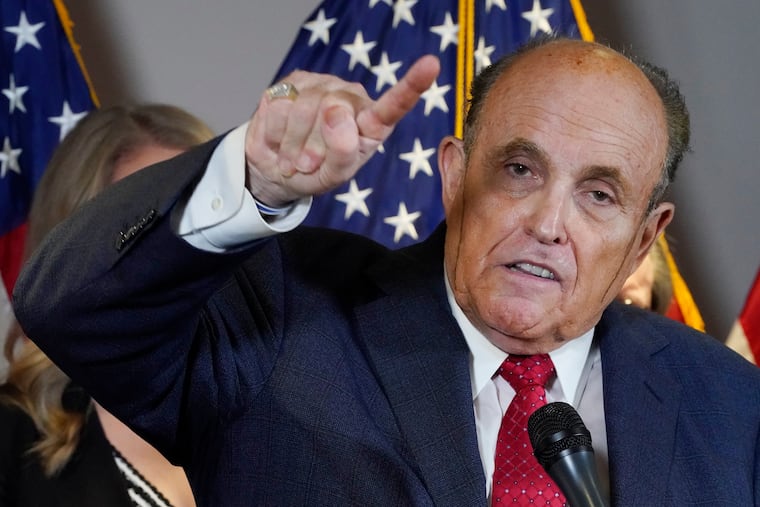Trump legal team pushes conspiracy theories of hacked voting machines — claims it called ludicrous four years ago in court
In a news conference, the president's lawyers floated unfounded conspiracy theories bearing little relation to cases they are arguing in court. They took a few jabs at Philly, too.

In a fever dream of a news conference Thursday, Donald Trump’s legal team pledged to finally lay out its evidence of a “massive, well-funded conspiracy” among Democratic officials in several U.S. cities and shadowy foreign actors to hijack the 2020 election in Pennsylvania and other battleground states.
But once it had, it amounted to little more than a ream of innuendo-laden affidavits — most of which they refused to release for fear, they said, of exposing their authors to the “tender mercies of a vicious press” — and wildly speculative, thoroughly debunked conspiracy theories about foreign-controlled voting machines.
Those pulling the strings, according to the president’s attorneys, would be familiar bogeymen to regular listeners of conservative talk radio. George Soros, the late Venezuelan President Hugo Chavez, the Clinton Foundation, China, Cuba, and antifa were all name-checked and said to have played roles in the plot.
And for good measure, Trump lawyer Rudy Giuliani threw in a few jabs specifically directed at Philadelphians, too.
With what appeared to be sweat and dark hair dye dripping down his face, Giuliani said he would have been more surprised if the city hadn’t rigged the 2020 race “because in the last 60 years, they’ve cheated in just about every election.”
Then, reprising his frequent, evidence-free claim of hundreds of Camden voters streaming across the Delaware River to cast ballots in the city, he claimed the practice was “about as common as people getting beaten up at a Philadelphia Eagles basketball game.”
(On that point, at least, Giuliani corrected himself moments later to identify the sport the team actually plays.)
But after nearly 90 minutes at the lectern, the broad thesis presented by the Trump campaign’s top legal advisers — which they described as their “opening statement” — bore little relation to what campaign lawyers had, at least up until recently, argued in the dozens of lawsuits they’ve filed to challenge results in Pennsylvania courts.
Before Giuliani became involved in the campaign’s chief case in the state this week, that suit’s legal claims had been focused solely on localized disputes over mail ballots and the level of access Republican monitors had to observe vote-counting in Democratic-leaning cities.
It was at a hearing Tuesday before U.S. District Judge Matthew W. Brann in Williamsport that Giuliani first floated his notion of a cabal of Democratic puppet masters working in concert to pull the strings. (Though in the same hearing, he conceded that “this is not a fraud case.”)
He has since asked Brann to consider a revised version of the lawsuit that steers hard into his unsubstantiated theory and requests that the judge block certification of the results or appoint the Republican-controlled state legislature to seize control of the process of selecting the state’s delegates to the Electoral College.
Responding in a court filing Thursday, Mark Aronchick — a lawyer representing several of the Pennsylvania counties that Giuliani has accused of fraud — pushed the judge to simply throw out the case instead, arguing that “conspiracy theory and innuendo, even when echoed in a federal courtroom, cannot salvage their frivolous federal claims.”
So far, the Trump team has steered away from referencing in their Pennsylvania suits the debunked claims about voting machines running programs funded in Venezuela and manipulated by conspirators in Germany and Spain that Trump lawyer Sidney Powell presented at Thursday’s Washington news conference.
“There’s video on the internet that will show you how a teen with a cellphone can hack one of these,” she said, in language strikingly similar to that offered by lawyers for the last failed presidential candidate who sought to cast doubt on the integrity of Pennsylvania voting machines in court.
In 2016, Green Party candidate Jill Stein sued state elections administrators days before the certification deadline for Pennsylvania’s election results, seeking a recount by offering vague, speculative concerns that its voting machines might have been hacked by foreign actors.
Like Trump in 2020, she offered no evidence that had actually happened. And ultimately a federal judge sitting in Philadelphia dismissed her request and a subsequent push to decertify the state’s voting machines as “daft,” “ill-considered” and “pointless.”
But early on in the proceedings, interested parties pushed back hard.
One fiery legal brief, in particular, roasted Stein for basing her case on nothing more than rank conjecture. It argued her campaign had no standing to pursue its constitutional claims in court.
And it accused Stein of using the lawsuit to “line her pockets with funds donated from those she has scared into believing that Pennsylvania’s electoral process was hijacked.”
Its author? The campaign of the then newly elected President Donald Trump, voicing arguments that have this year been marshaled against it in court.
“Ultimately, Stein cannot change the outcome of the presidential election,” Trump’s campaign lawyers wrote then. “She apparently has no qualms however, with creating chaos in her attempts to do so.”